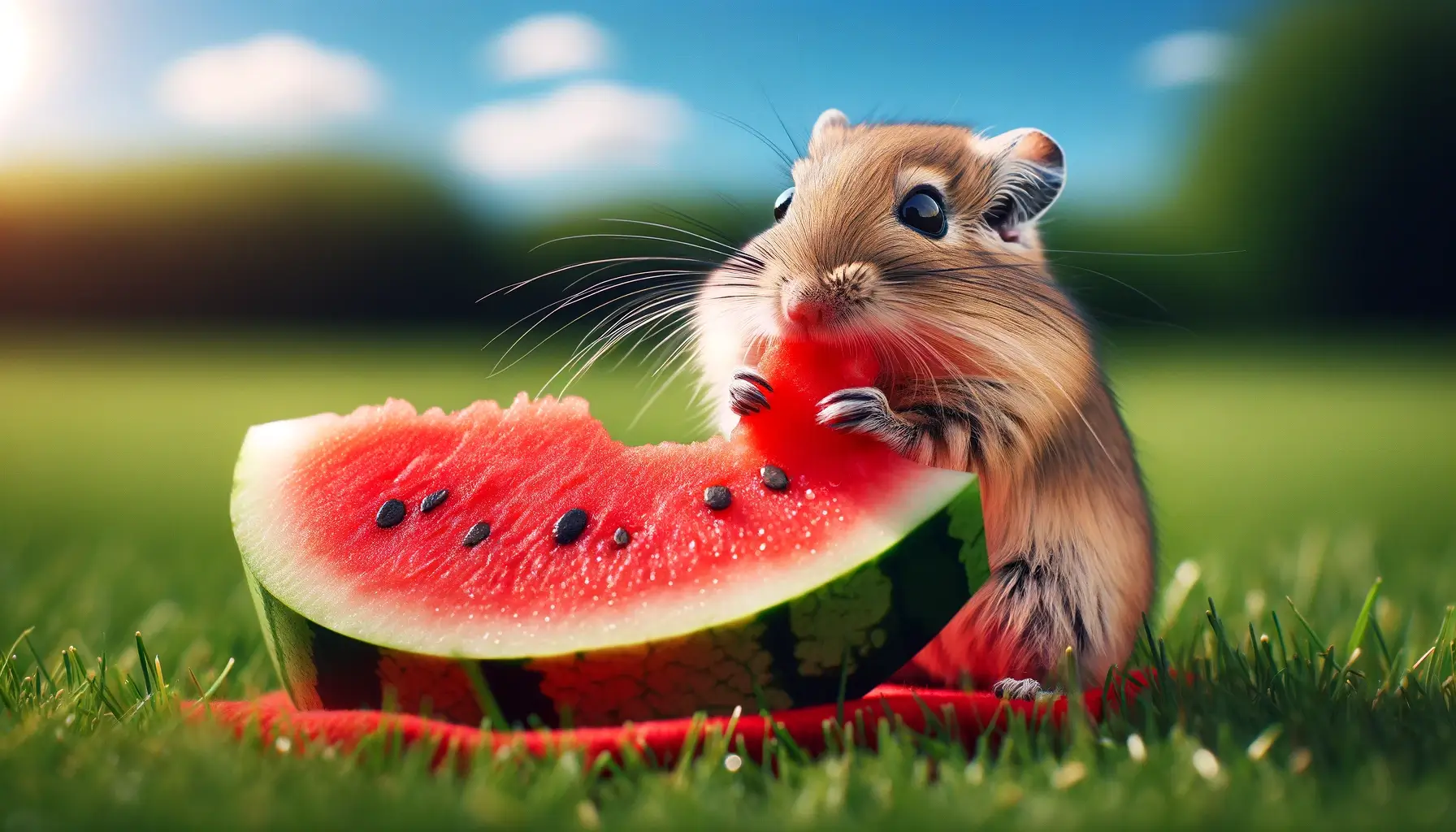Gerbils are fascinating and playful pets that have captured the hearts of many. These small rodents are known for their curious nature and adorable antics, making them a popular choice for pet lovers. When it comes to their diet, gerbils are not particularly fussy eaters, but that doesn’t mean they can eat everything.
A nutritious diet is essential for their health and well-being. This brings us to a common question among gerbil owners: Can gerbils eat watermelon?
In this article, we’ll dive deep into the topic, exploring the nutritional benefits and potential risks of feeding watermelon to gerbils.
Can Gerbils Eat Watermelon?
Watermelon is a refreshing and nutritious fruit that’s a staple in summer diets around the globe. It’s packed with vitamins and minerals, making it a healthy choice for humans.
But does the same apply to gerbils? The short answer is yes, gerbils can eat watermelon, but there are several important considerations to keep in mind.
Watermelon, with its high water content, can be a tasty treat for gerbils, especially during the warmer months. However, it should be given in moderation. The fruit’s high sugar content and water content can pose risks if consumed in large quantities.
Gerbils are desert animals, and their digestive systems are not designed to handle a lot of water or sugar. Therefore, while watermelon can be a part of your gerbil’s diet, it should only be a small portion of their overall nutritional intake.
| Nutrient | Amount per 100g |
|---|---|
| Water | 91.45 g |
| Energy | 30 kcal |
| Protein | 0.61 g |
| Total lipid (fat) | 0.15 g |
| Carbohydrate, by difference | 7.55 g |
| Fiber, total dietary | 0.4 g |
| Sugars, total including NLEA | 6.2 g |
| Calcium, Ca | 7 mg |
| Iron, Fe | 0.24 mg |
| Magnesium, Mg | 10 mg |
| Phosphorus, P | 11 mg |
| Potassium, K | 112 mg |
| Sodium, Na | 1 mg |
| Zinc, Zn | 0.1 mg |
| Vitamin C, total ascorbic acid | 8.1 mg |
| Thiamin | 0.033 mg |
| Riboflavin | 0.021 mg |
| Niacin | 0.178 mg |
| Vitamin B-6 | 0.045 mg |
| Vitamin A, RAE | 28 µg |
| Lycopene | 4532 µg |
Watermelon and Gerbil Health

Water Content in Watermelon and Its Effect on Gerbils
Watermelon is made up of approximately 92% water. This makes it an excellent source of hydration for humans, but for gerbils, this high water content can lead to diarrhea and other digestive issues if they consume too much.
Gerbils naturally get most of the water they need from their food, and their bodies are adapted to conserve water efficiently. Introducing a high-water-content food like watermelon into their diet needs to be done cautiously.
Sugar Content in Watermelon
Another aspect to consider is the sugar content in watermelon. While it’s lower than some other fruits, such as bananas or grapes, it’s still significant. Gerbils have a sweet tooth and will likely enjoy the taste of watermelon, but too much sugar can lead to obesity and diabetes in these small animals. As with any treat, moderation is key.
Potential Health Benefits and Risks
Despite these concerns, watermelon can offer some nutritional benefits to gerbils when fed properly. It contains vitamins A, B6, and C, as well as antioxidants and amino acids. These nutrients can support a gerbil’s immune system and overall health.
However, the potential health risks associated with overconsumption of watermelon, such as diarrhea and obesity, cannot be overlooked. To safely incorporate watermelon into your gerbil’s diet, offer small, bite-sized pieces no more than once a week.
This will minimize the risks while allowing your gerbil to enjoy the occasional refreshing treat.
How to Feed Watermelon to Gerbils?
Feeding watermelon to your gerbil can be a delightful treat on a hot day, but it’s essential to do it correctly to avoid any health issues. Here’s how you can safely introduce watermelon into your gerbil’s diet:
- Preparing Watermelon: Start by choosing a fresh, ripe watermelon. Wash the exterior to remove any pesticides or dirt. Cut a small, bite-sized piece of watermelon flesh, ensuring it’s seedless. Seeds can be choking hazards or induce intestinal obstructions.
- Recommended Portion Sizes: Gerbils are small, and their portions should be too. A piece of watermelon the size of a gerbil’s head is more than enough. This small amount prevents overconsumption of water and sugar, reducing the risk of digestive issues.
- Frequency of Feeding Watermelon to Gerbils: Watermelon should be considered an occasional treat, not a dietary staple. Offering a small piece once every week or two during warmer months is sufficient. This frequency ensures your gerbil enjoys the benefits of watermelon without the risks associated with overeating.
By following these guidelines, you can safely add a splash of variety to your gerbil’s diet with watermelon, keeping them hydrated and happy without compromising their health.
Alternatives to Watermelon for Gerbils
While watermelon can be a refreshing treat, it’s not the only fruit your gerbil can enjoy. Here are some safer, nutritious alternatives that are less likely to cause health issues:
- Bananas: Offer tiny slices of banana as a treat. Bananas are rich in potassium and vitamins but also high in sugar, so moderation is key.
- Apples: Apples (without the seeds, as they can be toxic) are a crunchy, hydrating snack. Ensure they are cut into small, manageable pieces.
- Carrots: Carrots can be a crunchy, nutritious snack offering vitamins and fiber. A small piece of carrot can provide a satisfying chew for your gerbil.
- Broccoli: This vegetable is packed with nutrients and can be given in small, bite-sized pieces. It’s also low in sugar, making it a healthier choice.
- Raspberries: Offer one or two raspberries as a treat. They’re low in sugar compared to other fruits and provide antioxidants.
These alternatives provide variety and essential nutrients to your gerbil’s diet without the high water content risk of watermelon. To avoid gastric distress, new foods should always be introduced gradually and moderately.
FAQs
Can gerbils eat watermelon seeds?
Watermelon seeds should be strictly avoided when feeding your gerbil. These seeds can be a significant choking hazard and may also lead to intestinal blockages if ingested. It’s crucial to ensure that any piece of watermelon offered to your gerbil is completely seedless to prevent these risks. Opting for seedless varieties of watermelon when preparing treats for your pet is the safest approach.
Is watermelon rind safe for gerbils?
Feeding watermelon rind to gerbils is not recommended. The rind is much tougher than the flesh of the watermelon, making it difficult for gerbils to digest. Additionally, the outer surface of watermelon can be treated with pesticides or other chemicals, posing a potential health risk.
To ensure the safety and well-being of your gerbil, it’s best to stick to offering the soft, juicy flesh of the watermelon, free from any seeds or rind.
Can gerbils eat melon?
Yes, gerbils can eat melon in very small quantities as an occasional treat. Melons, like watermelon, cantaloupe, and honeydew, offer hydration and vitamins but also contain high sugar and water content, which can be problematic for gerbils if consumed in excess.
Always remove the seeds and serve tiny, manageable pieces to avoid digestive issues and ensure a balanced diet.
How often can gerbils eat watermelon?
Watermelon should be treated as a special snack for gerbils, not a regular part of their diet. Given its high water and sugar content, watermelon is best offered sparingly to avoid digestive issues or imbalances in your gerbil’s diet.
A small, bite-sized piece provided once every week or two during the warmer months is an appropriate frequency. This moderation allows your gerbil to enjoy the benefits of this refreshing treat without the associated risks of overconsumption.
Conclusion
In conclusion, while gerbils can enjoy watermelon as a refreshing treat, it’s essential to offer it in moderation due to its high water and sugar content. Small, seedless, and rind-free portions served occasionally can add variety to your gerbil’s diet without causing health issues. Remember to consider safer fruit and vegetable alternatives that are less likely to disrupt their delicate digestive system.
By following these guidelines, you can ensure your gerbil enjoys the occasional watermelon treat safely, keeping them happy and healthy. Always prioritize a balanced diet to support your furry friend’s overall well-being.











